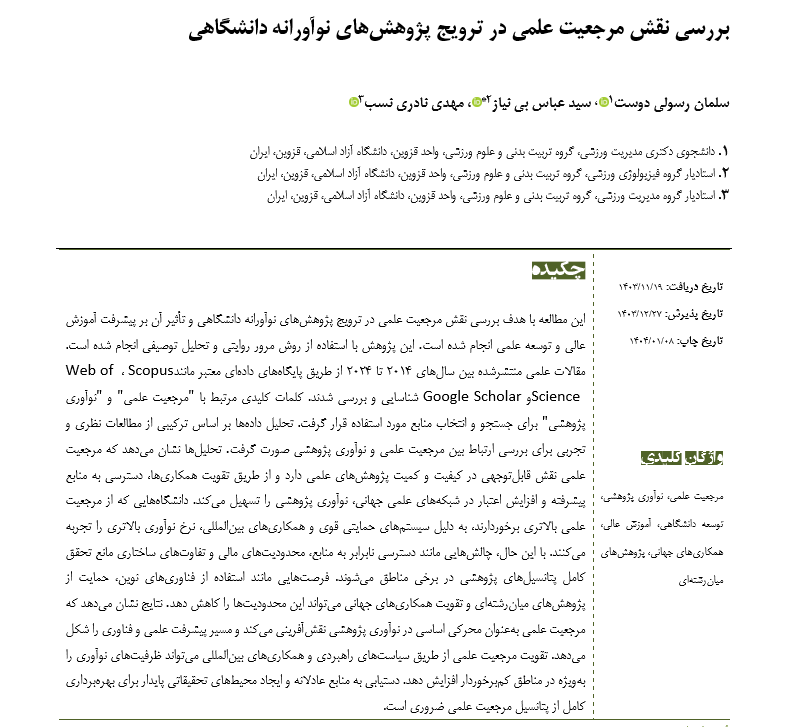Examining the Role of Scientific Authority in Promoting Innovative Academic Research
Keywords:
Scientific authority, research innovation, academic development, higher education, global collaboration, interdisciplinary researchAbstract
This study aims to investigate the role of scientific authority in promoting innovative academic research and its impact on the advancement of higher education and scientific development. A narrative review methodology was employed, focusing on a descriptive analysis of articles published between 2014 and 2024. The study utilized scholarly databases, including Scopus, Web of Science, and Google Scholar, to identify relevant literature. Keywords related to "scientific authority" and "research innovation" guided the search and selection process. The findings were analyzed through a qualitative synthesis of theoretical and empirical studies to explore the relationship between scientific authority and research innovation. The analysis highlights that scientific authority significantly influences the quality and quantity of academic research by fostering collaboration, enabling access to advanced resources, and enhancing credibility in global scientific networks. Universities with strong scientific authority exhibit higher innovation rates due to structured support systems and international collaborations. Despite these advantages, challenges such as unequal access to resources, financial constraints, and institutional disparities hinder the realization of full research potential in some regions. Opportunities for enhancing scientific authority include adopting advanced technologies, supporting interdisciplinary research, and fostering global partnerships to overcome existing limitations. The study concludes that scientific authority is a critical driver of research innovation, shaping the trajectory of academic and technological advancements. Strengthening scientific authority through strategic policies and global collaboration can enhance innovation capabilities, particularly in underrepresented regions. Promoting equitable access to resources and fostering sustainable research environments are essential for leveraging the full potential of scientific authority in advancing academic research.
Downloads
References
Zhylinska О, Sitnicki MW, Викулова А. Systematic Assessment of the Innovative Potential of a Research University.
Baltic Journal of Economic Studies. 2019;5(2):38. doi: 10.30525/2256-0742/2019-5-2-38-44.
Castellanos ECO, Delgado LDG. Strategic Innovation: Conception of Innovation Among Social Sciences Researchers
in Higher Education in Northwestern México. Innovative Higher Education. 2022;47(5):855-74. doi: 10.1007/s10755-022-
-8.
Bednarczyk G, Trzmielak D. The Innovative Potential of Scientific and Research Units in the Process of
Entrepreneurial Discovery — Examples From Selected Eu Regions. Marketing of Scientific and Research Organizations.
;46(4):115-36. doi: 10.2478/minib-2022-0024.
Romanovskyі O, Romanovska YY, Romanovska OO. The Impact of Academic Capitalism on the Formation of
Innovation Policies in Higher Education and Science. Baltic Journal of Economic Studies. 2021;7(5):169-83. doi:
30525/2256-0742/2021-7-5-169-183.
Ge S, Hui X, Wan Q. Research on the Strategy of Students' Ability to Innovate in Science and Technology.
International Journal of Information and Education Technology. 2018;8(11):838-41. doi: 10.18178/ijiet.2018.8.11.1150.
Elnasri A, Fox KJ. The Contribution of Research and Innovation to Productivity. Journal of Productivity Analysis.
;47(3):291-308. doi: 10.1007/s11123-017-0503-9.
Nepelski D, Piroli G. Organizational Diversity and Innovation Potential of EU-funded Research Projects. The Journal
of Technology Transfer. 2017;43(3):615-39. doi: 10.1007/s10961-017-9624-6.
Fan G, Huang Z, Sun H, Li Z, Wu X, Li C, et al. Construction and Analysis of Evaluation Model for Medical Students'
Innovation Competency Based on Research‐oriented Biochemistry and Molecular Biology Course in China. Biochemistry and
Molecular Biology Education. 2023;51(3):263-75. doi: 10.1002/bmb.21719.
Fadeykina NV, Bieiadovskii T, Malina S. The Level of Research and Development Sector Involvement in the
Implementation of Regions' Innovative Growth. 2018. doi: 10.2991/cssdre-18.2018.51.
Jia Y, Liu C, Chen Y, Zhu Q. The Construction of Science and Technology Innovation Policy Design Framework—
take Shandong Province as an Example. Journal of Industry-University Collaboration. 2020;2(1):34-48. doi: 10.1108/jiuc-08-
-0015.
Xu F, Wu L, Evans JA. Flat Teams Drive Scientific Innovation. Proceedings of the National Academy of Sciences.
;119(23). doi: 10.1073/pnas.2200927119.
Zhu Z, Cui S, Wang Y, Zhu Z. Exploration on the Collaborative Relationship Between Government, Industry, and
University From the Perspective of Collaborative Innovation. Applied Mathematics and Nonlinear Sciences. 2022;7(2):903-
doi: 10.2478/amns.2021.2.00174.
Sitnicki MW. Determining the Priorities of the Development of EU Research Universities Based on the Analysis of
Rating Indicators of World-Class Universities. Baltic Journal of European Studies. 2018;8(1):76-100. doi: 10.1515/bjes-2018-
Skyba M. Innovative Potential: Research on the Scientific-Categorical Apparatus of Innovation Economy. Economies
Horizons. 2019(1(8)):63-76. doi: 10.31499/2616-5236.1(8).2019.175426.
Li C, Hou YL, Liu GY. Expanding of College Students’ Scientific Quality and Innovation With the Carrier of Research
Program. Advanced Materials Research. 2010;171-172:90-3. doi: 10.4028/www.scientific.net/amr.171-172.90.
Li Y. Foreign Research Project Management Practices and Experience Inspiration for China. 2023:974-80. doi:
2991/978-94-6463-256-9_95.
Liu H. A Visualized Analysis of Scientific Research Evaluation in Colleges and Universities Based on the Scientific
Knowledge Mapping. 2023:930-9. doi: 10.2991/978-94-6463-262-0_96.
Qi Y, Wang J. A Talent Cultivation Model for Improving the Innovation Ability of College Students in Scientific
Research. International Journal of Emerging Technologies in Learning (Ijet). 2020;15(18):151. doi: 10.3991/ijet.v15i18.16745.
Symakov V. Scientific Achievements in the Field of Research of Innovative Economic Forms of Entrepreneurship.
Economies Horizons. 2019(4(11)):65-73. doi: 10.31499/2616-5236.4(11).2019.219073.
Stone C, Dogbey G, Klenzak S, Fossen K, Tan BM, Brannan GD. Contemporary Global Perspectives of Medical
Students on Research During Undergraduate Medical Education: A Systematic Literature Review. Medical Education Online.
;23(1):1537430. doi: 10.1080/10872981.2018.1537430.
Lin Q, Song B. A Literature Review of New Types of Scientific Research Institutions. 2019. doi: 10.2991/jahp19.2019.113.
Tan C. Research on the Path of Sports Sociology Curriculum From the Interdisciplinary Perspective. Mobile
Information Systems. 2022;2022:1-8. doi: 10.1155/2022/3415257.
Taubayev A, Rakhmetova A, Kalkabayeva G, Saifullina Y, Жукенов БМ. Problems of Research Funding in the AgroIndustrial Complex of Kazakhstan. Journal of Asian and African Studies. 2022;58(8):1656-64. doi:
1177/00219096221097664.
Wang H, Yang C, Meng M, Zeng Y. Research on the Initiative Scientific Research and Innovation Behavior of
Postgraduates: Based on the Theory of Planned Behavior. Frontiers in Psychology. 2022;13. doi: 10.3389/fpsyg.2022.839981.

Downloads
Published
Submitted
Revised
Accepted
Issue
Section
License
Copyright (c) 2025 Journal of Study and Innovation in Education and Development

This work is licensed under a Creative Commons Attribution-NonCommercial 4.0 International License.










